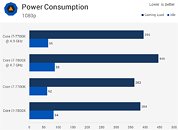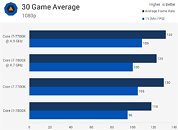Raevenlord
News Editor
- Joined
- Aug 12, 2016
- Messages
- 3,755 (1.18/day)
- Location
- Portugal
| System Name | The Ryzening |
|---|---|
| Processor | AMD Ryzen 9 5900X |
| Motherboard | MSI X570 MAG TOMAHAWK |
| Cooling | Lian Li Galahad 360mm AIO |
| Memory | 32 GB G.Skill Trident Z F4-3733 (4x 8 GB) |
| Video Card(s) | Gigabyte RTX 3070 Ti |
| Storage | Boot: Transcend MTE220S 2TB, Kintson A2000 1TB, Seagate Firewolf Pro 14 TB |
| Display(s) | Acer Nitro VG270UP (1440p 144 Hz IPS) |
| Case | Lian Li O11DX Dynamic White |
| Audio Device(s) | iFi Audio Zen DAC |
| Power Supply | Seasonic Focus+ 750 W |
| Mouse | Cooler Master Masterkeys Lite L |
| Keyboard | Cooler Master Masterkeys Lite L |
| Software | Windows 10 x64 |
Over at Techspot, Steven Walton managed to get a hold of Intel's new six-core, 12-thread Core i7-7800X CPU, and chose to take it for a spin over a levy of gaming benchmarks. The results don't bode particularly well for Intel's new top i7 offering, though: it is soundly beat by its smaller, svelter brother in virtually all gaming tasks.
Out-of-the-box results are somewhat in line with what we would expect: the Core i7-7700K does bring about a base clock increased by 700 MHz compared to the i7-7800X (4.2 GHz vs 3.5 GHz), and has a higher boost clock to boot (4.5 GHz vs 4 GHz.) And as we've seen over and over again, including with Intel rival AMD's Ryzen offerings, frequency usually trumps core count when it comes to performance when applications are exposed more than four cores. And this leads to Walton's results: the Core i7 7700K is still king in pure FPS terms, coming in with a much more attractive proposition than the 7800X in both minimum and maximum FPS, as well as power consumption.


Now, to be fair, most of us were probably expecting that: consumer application optimization for high core-count processors (if we can actually call a six-core a high core-count processor in a soon to be Threadripper-infused world, but I digress) is sorely lacking. However, what really paints Intel's i7-7800X in a bad light is that its performance continues to be lacking even when it has a frequency advantage over the 7700K. As you can see in the performance metrics, a Core 17-7800X overclocked to 4.7 GHz (with a 500 MHz advantage over stock clocks of the 7700K and 200 MHz over its Boost clock) still performs slower than it. The stock 7700K has 5% higher minimum and maximum framerates than the 7800X, despite being clocked lower, having a ridiculously lower amount of L2 cache, and having about the same total L3 cache (which actually results in an about 30% lower available L3 cache per core.) And these lower frame rates are delivered with a 41% higher idle power consumption, and 23% higher gaming power consumption. Check the source link for some detailed benchmarks. As for all this, it seems that while Intel likes to take digs on AMD for their "glued-together" desktop dies repurposed for servers, Intel's 7800X, which has its cache hierarchy and core interconnect re-architected for servers, may be little more than a repurposed server CPU for the desktop crowds...
View at TechPowerUp Main Site
Out-of-the-box results are somewhat in line with what we would expect: the Core i7-7700K does bring about a base clock increased by 700 MHz compared to the i7-7800X (4.2 GHz vs 3.5 GHz), and has a higher boost clock to boot (4.5 GHz vs 4 GHz.) And as we've seen over and over again, including with Intel rival AMD's Ryzen offerings, frequency usually trumps core count when it comes to performance when applications are exposed more than four cores. And this leads to Walton's results: the Core i7 7700K is still king in pure FPS terms, coming in with a much more attractive proposition than the 7800X in both minimum and maximum FPS, as well as power consumption.


Now, to be fair, most of us were probably expecting that: consumer application optimization for high core-count processors (if we can actually call a six-core a high core-count processor in a soon to be Threadripper-infused world, but I digress) is sorely lacking. However, what really paints Intel's i7-7800X in a bad light is that its performance continues to be lacking even when it has a frequency advantage over the 7700K. As you can see in the performance metrics, a Core 17-7800X overclocked to 4.7 GHz (with a 500 MHz advantage over stock clocks of the 7700K and 200 MHz over its Boost clock) still performs slower than it. The stock 7700K has 5% higher minimum and maximum framerates than the 7800X, despite being clocked lower, having a ridiculously lower amount of L2 cache, and having about the same total L3 cache (which actually results in an about 30% lower available L3 cache per core.) And these lower frame rates are delivered with a 41% higher idle power consumption, and 23% higher gaming power consumption. Check the source link for some detailed benchmarks. As for all this, it seems that while Intel likes to take digs on AMD for their "glued-together" desktop dies repurposed for servers, Intel's 7800X, which has its cache hierarchy and core interconnect re-architected for servers, may be little more than a repurposed server CPU for the desktop crowds...
View at TechPowerUp Main Site







